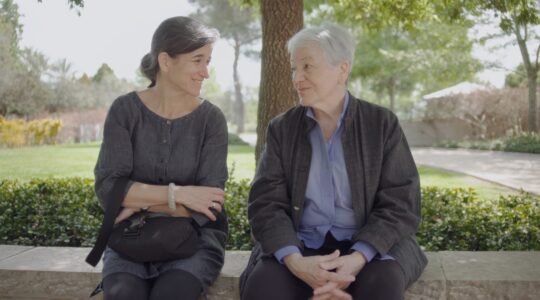In what is likely a first at a conference under Orthodox auspices, new research on sexual dysfunction among observant women reveals that they have about the same problems in the marriage bed as do other American women.
The initial findings of the study, carried out by New York psychiatrist Dr. Michelle Friedman, will be released at this weekend’s Jewish Orthodox Feminist Alliance gathering.
Friedman, who counts among her private clients many right-wing Orthodox women, was spurred to study the Orthodox community by research released a few years ago about the state of sexual pleasure (and its lack) among Americans.
She began to wonder if there are similarities in the religious community, where sexual norms — chastity before marriage and abstention for roughly half of each month — are quite different than those in American society as a whole.
Conventional wisdom purveyed by books devoted to explaining the “Laws of Family Purity” say the codes provide spiritual and physical benefits to Jewish couples. They mandate a couple’s physical separation during the wife’s menstrual period and for a week afterward.
Also often touted is the notion that marital communication is improved when a couple cannot resolve an argument with a kiss and a hug. The period of abstention is concluded with the woman’s immersion in a mikveh, or ritual bath.
But initial analysis of data gathered anonymously from about 200 Orthodox women over the past two years shows they have roughly the same rate of sexual dysfunction as married Americans overall.
Roughly 20 percent of respondents reported that they experience sexual dysfunction — pain during intercourse, a lack of pleasure or avoidance of sexual intimacy, said Friedman. “There are also a small but significant number of unconsummated marriages,” she said.
The majority of women said that observing family purity has not led them to communicate better with their husbands during the non-physical time of the month.
“One of the things that comes through in the study is that women really wish they had been taught more about sex early on,” Friedman said in an interview with The Jewish Week. “We thought that a vehicle for that information would be the kallah [bride] classes that many Orthodox women take before they get married.
“But they aren’t teaching it well. The kallah classes tend to be focused on not doing things wrong. There’s often very little taught about pleasure in sexual life.
“A lot of women wrote in that they didn’t know they had a right to sexual pleasure. Some women wrote about going from this chaste virgin to being a sexually pleasured woman was confusing at the beginning of their marriages, and upsetting when their ben Torahs [students of Torah] turned into these lusty guys,” she said.
Some women also indicated that they had been informed about the possibility of infertility, which they faced later on, said Friedman. Overarching much of the response was that “the wish to normalize aspects of sexual life was important to women.”
Respondents indicated that they are far more likely to turn to rabbis with questions about observing Shabbat and keeping kosher than they are about their sex lives, Friedman said.
There is no place for women with sexual problems to turn in the religious community, she said.
“People ask doctors for advice or look to popular books. If a woman isn’t having an orgasm, she won’t be able to find out why by looking in a Jewish bookstore,” though books addressing just about every other aspect of life from a religious perspective are available there, Friedman said.
“I’m not looking for a Cosmo magazine for the frum community,” she said. “We’re not looking to do something sensationalist. But it’s very important that somehow information and conversation enlarge while parameters of modesty are maintained. That’s a very important goal of this study.”
Once the study is expanded to several hundred respondents and findings are analyzed, Friedman plans to release them widely to people and organizations that can develop new materials to assist religious women with sexual issues.
“There could be workshops for kallah class teachers, and women educators in seminaries and high schools, things that could be brought in on a very regular basis,” Friedman said.
But her immediate goal is to increase and broaden her study sample. The questionnaire initially was distributed through gynecologists, pediatricians and word of mouth, and sent back by a disproportionate amount of women with graduate degrees, for instance. Friedman said she needs to get responses from more haredi, or fervently Orthodox, women.
Mikvehs asked to distribute the questionnaire — the most logical place to disseminate it, Friedman said — refused.
“This is still all perceived as touchy stuff,” she said.
The New York Jewish Week brings you the stories behind the headlines, keeping you connected to Jewish life in New York. Help sustain the reporting you trust by donating today.




